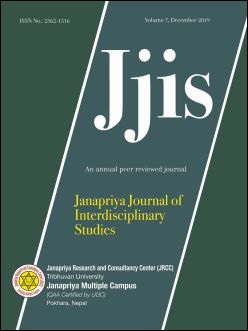Knowledge on Preconception Care Among Reproductive Aged Women in Kaski District, Nepal
DOI:
https://doi.org/10.3126/jjis.v7i1.23049Keywords:
Education, knowledge, preconception care, reproductive aged womenAbstract
Preconception care is any intervention provided to women and couples of childbearing age, regardless of pregnancy status or desire, before pregnancy, to improve health outcomes for women, newborns and children. The aim this study was to assess level of knowledge among reproductive aged women and to find out association between selected demographic variables and knowledge. A descriptive cross sectional research design was used to conduct the study. Non probability purposive sampling technique was used to select 220 reproductive aged women in Pokhara, Metropolitan city-32; Janachautra, Malmul. Data was collected through structured interview schedule and analyzed using SPSS version 16. Data was analyzed using descriptive and inferential statistics such as frequency, percentage, mean, standard deviation, Chi-square test. The findings revealed that about 20 percent of respondents possessed poor knowledge followed by 64.5 percent of the respondents possessed average level of knowledge and 15.5 percent of respondents possessed good level of knowledge. The mean score for the level of knowledge was 50.6±10.6. There was statistically significant association between level of knowledge on preconception care with education, number of children, heard about preconception care, source of information (p<0.005). It concludes that majority of the respondents had average level of knowledge so, awareness program is required to to prevent the health risks of women and offspring in the near future and to improve the different aspects of knowledge regarding preconception care.




